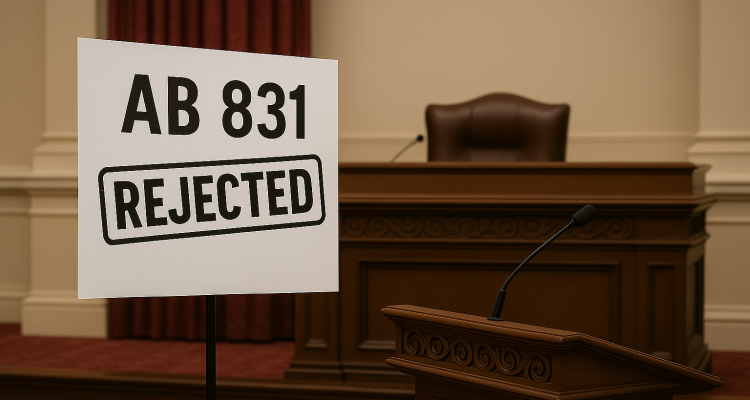California Assembly Bill 831 (AB831) has sparked significant controversy, with widespread opposition from both industry leaders and residents. The bill aims to prohibit online sweepstakes games, including legitimate “freemium plus sweepstakes” digital entertainment that has been available for years. These games, while offering promotional models similar to those seen in retail, food, and political campaigns, would be banned under the legislation. Many experts and stakeholders argue that the bill is less about protecting players and more about limiting competition, particularly from new or smaller digital platforms.
Legislative process and concerns:
The Social Gaming Leadership Alliance (SGLA) has been vocal in its opposition, claiming in its press release that AB831 would severely damage the industry without proper consideration. According to Jeff Duncan, SGLA’s Executive Director, “This bill isn’t about protecting players. It is about protecting incumbents from competition.” Furthermore, the SGLA has pointed out that the games targeted by AB831 maintain comprehensive consumer protections, such as robust age verification processes, anti-money laundering (AML) safeguards, and responsible gaming tools.
The legislation was advanced by the California Senate Governmental Organization Committee on July 8, after being inserted into an unrelated bill back in June. This rushed process has raised alarms among critics, with lawmakers questioning key provisions and definitions within the bill. In the hearing, senators expressed concerns about the lack of clarity and stakeholder input, with some reserving the right to change their votes pending further information.
Senator Ochoa Bogh aptly remarked, “this is what happens when we don’t go through the proper process,” highlighting the importance of a thorough legislative process before passing such complex bills. The bill’s passage to the Senate Public Safety Committee for further review is set for July 15, but the growing controversy surrounding it has only intensified.
AB831 has prompted vocal opposition from various industry coalitions, including the Social and Promotional Games Association (SPGA), which represents the interests of digital promotions. According to the SPGA, the bill fails to define crucial terms such as “dual currency system,”“indirect consideration,” and “cash equivalents,” creating a vague and potentially harmful regulatory environment. The SPGA also raised concerns over the bill’s potential to criminalize businesses, with penalties that could include hefty fines and jail time for vendors, media platforms, and payment providers.
Both the SGLA and SPGA argue that AB831 could unintentionally affect legitimate digital promotions currently used by major brands. The measure would classify many common sweepstakes models as prohibited, despite the fact that these systems are already regulated and widely accepted across other sectors.
This growing opposition extends beyond industry groups, with thousands of California residents voicing their concerns. In just one week leading up to the committee hearing, more than 20,000 residents sent letters, calls, and texts to state legislators to express their dissatisfaction with the bill.
Concerns over innovation and competition:
One of the key criticisms of AB831 is that it unfairly targets smaller companies offering legitimate digital entertainment while providing cover for larger, well-established competitors. The SGLA has emphasized that the bill’s provisions would stifle innovation in California’s digital economy, potentially harming the very consumers it is meant to protect.
Several industry leaders have pointed out the irony of the bill’s backers, many of whom operate similar games, pushing for the ban. Gaming attorney Bill Gantz, speaking on behalf of the SGLA, pointed out that social casino freemium games have been a legitimate form of entertainment in California since 2012 and have followed the same regulatory frameworks as other types of digital entertainment.
With the bill’s future still uncertain, both the SGLA and SPGA are calling for AB831 to be converted into a two-year bill. This would allow more time for comprehensive stakeholder consultation, clearer definitions, and a more thorough review process. As the controversy grows, it is clear that this legislation requires much more scrutiny before it can advance further.


